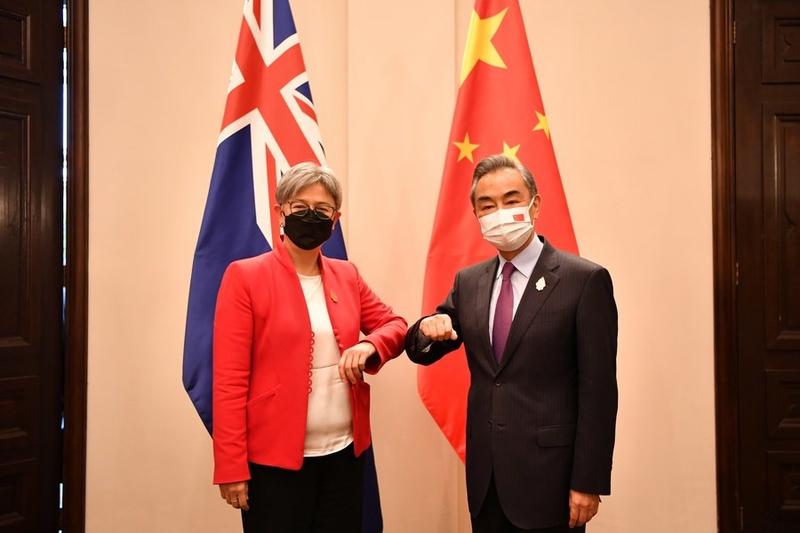Beijing is willing to recalibrate bilateral ties based on mutual respect, FM says
 Chinese State Councilor and Foreign Minister Wang Yi meets with Australian Foreign Minister Penny Wong in Bali, Indonesia, July 8, 2022. (XU QIN / XINHUA)
Chinese State Councilor and Foreign Minister Wang Yi meets with Australian Foreign Minister Penny Wong in Bali, Indonesia, July 8, 2022. (XU QIN / XINHUA)
Beijing has urged Canberra to seize the current opportunity and reshape its understanding of China as the two countries agreed to stabilize relations and put the ties back on the right track.
The pledge was made by State Councilor and Foreign Minister Wang Yi and Australian Foreign Minister Penny Wong on Friday during a meeting on the sidelines of the G20 Foreign Ministers' Meeting in Indonesia.
It was the first meeting of the two countries' foreign ministers since 2019 and also the first between the two officials since the new Australian prime minister took office in May.
Wang said the root of the difficulties in China-Australia relations over the past years was the former Australian government's insistence on regarding China as a rival, or even a threat, and allowing irresponsible words and actions against China.
As this year marks the 50th anniversary of diplomatic relations between the two countries, Wang said China is willing to recalibrate bilateral ties based on mutual respect.
He suggested that Australia stay committed to viewing China as a partner rather than a rival and to seeking common ground while shelving differences.
Wang said Australia should stop targeting any third party and being manipulated by any third party, and build public support featuring positiveness and pragmatism.
A healthy development of bilateral ties conforms to the common interests of both peoples and helps protect peace and stability in the Asia-Pacific region, he added.
Wong said that her country hopes to make Australia-China ties more stable and mutually beneficial, and she pledged Canberra's continuous commitment to the one-China principle.
Australia has no intention of magnifying its differences with China, nor of joining in the containment of China, she said.
Australia would like to maintain constructive contact and exchanges, increase mutual trust, expand equal cooperation and remove existing barriers in bilateral ties, she added.
In response to Australia's repeated concerns over China's cooperation with Pacific Island nations, Wang stressed that China's cooperation with the countries is based on equality.
He added that China is willing to conduct tripartite cooperation in the South Pacific region with countries including Australia and New Zealand to achieve win-win and multiple-win results.
The meeting was a crucial and substantial step in efforts to repair bilateral relations, and the ball is in Canberra's court to improve its ties with Beijing, observers said.
Chen Hong, director of East China Normal University's Australian Studies Center, wrote in an article that the former Australian government tied Canberra to Washington's anti-China chariot and hyped China as a strategic opponent, which was not in Australia's interests.
The new Australian government should not allow its relations with China to continue to deteriorate, he said.
China remained Australia's largest trade partner in 2021, with bilateral trade volume reaching $231.2 billion.
"Canberra needs to show enough sincerity to avoid seeing its ties with Beijing through the lens of geopolitical competition," said Lin Duo, research fellow of the Department for Asia-Pacific Studies at the China Institute of International Studies.
Australia should focus on mutually beneficial cooperation, do more to enhance mutual trust and meet China halfway, he added.


